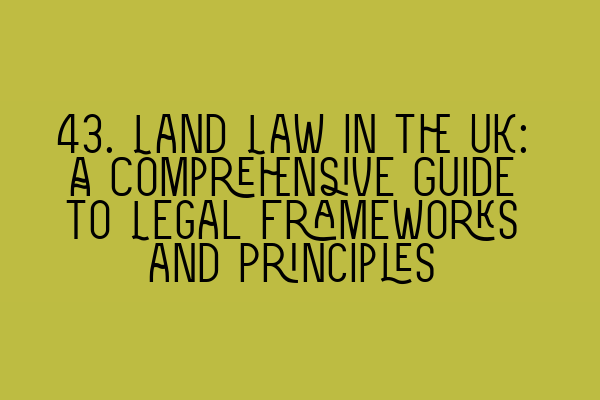43. Land Law in the UK: A Comprehensive Guide to Legal Frameworks and Principles
Welcome to SQE Property Law & Land Law’s comprehensive guide to land law in the UK. Whether you are a solicitor, law student, or simply interested in gaining a deeper understanding of the legal frameworks and principles governing land in the UK, this blog post will provide you with a wealth of knowledge. We will delve into key concepts, case law, and legislation that shape the landscape of land law in the UK.
1. Introduction to Land Law
Land law is a fundamental area of law that governs the rights and interests in land, as well as the obligations and responsibilities associated with land ownership. It encompasses various aspects, including property rights, leases, mortgages, easements, and more.
At SQE Property Law & Land Law, we understand the significance of having a strong foundation in land law. It is essential for solicitors and legal professionals to navigate complex issues related to land transactions, disputes, and compliance with legal requirements.
2. Legal Frameworks and Principles
Understanding the legal frameworks and principles that underpin land law is crucial for anyone working in the field. The following sections will provide an overview of some key elements:
2.1. Property Rights
Property rights refer to the legal ownership and control that individuals or entities have over land. These rights include the right to possess, use, and enjoy the land, as well as the right to exclude others from interfering with these rights.
When dealing with property rights, it is essential to be familiar with the various estates and interests that can be held in land. This includes freehold and leasehold estates, as well as legal and equitable interests.
To gain a more in-depth understanding of property rights and the different types of estates and interests, consider taking SQE 1 Practice Exam Questions and SQE 1 Practice Mocks FLK1 FLK2. These comprehensive practice resources will help you test your knowledge and prepare for the SQE exams.
2.2. Conveyancing
Conveyancing is the legal process of transferring ownership of land from one party to another. It involves various steps, such as drafting and negotiating contracts, conducting property searches, and registering the transfer with the appropriate authorities.
When engaging in conveyancing transactions, it is vital to be aware of the relevant legislation, such as the Law of Property Act 1925 and the Land Registration Act 2002. This legislation sets out the requirements and procedures for validly transferring land.
If you are seeking to enhance your skills in conveyancing, SQE 2 Preparation Courses and SQE 1 Preparation Courses are excellent resources to consider. These courses provide comprehensive training and guidance to prepare you for the SQE exams and practical practice.
2.3. Easements and Covenants
Easements and covenants are legal rights and obligations that attach to land. Easements grant a person or entity the right to use another person’s land for a specific purpose, such as a right of way. Covenants, on the other hand, are obligations imposed on the owner of land to do or not do certain things.
Understanding the legal requirements for creating, enforcing, and terminating easements and covenants is essential for advising clients and resolving disputes. Relevant legislation includes the Land Registration Act 2002 and the Law of Property Act 1925.
3. Case Law and Precedents
Case law plays a vital role in the development and interpretation of land law in the UK. Several landmark cases have shaped the legal principles and frameworks we abide by today. Some notable cases include:
- London and Blenheim Estates v Ladbroke Retail Parks Limited (1993): This case established the criteria for determining whether a right can be claimed as an easement.
- Bolton v Stone (1951): This case defined the standard of care owed by landowners regarding the safety of their premises.
- Covenants created by deed and restrictive covenants: Various cases have dealt with the enforceability and interpretation of covenants, such as Tulk v Moxhay (1848).
4. The Impact of Land Law on Practice
Land law has a significant impact on legal practice, particularly in areas such as property transactions, commercial leases, real estate development, and dispute resolution.
For aspiring solicitors, it is essential to stay updated on the latest developments and changes in land law. The SRA SQE Exam Dates are a valuable resource to keep track of upcoming exams and ensure you are adequately prepared.
Additionally, continuous learning and professional development through practice exams, mocks, and courses can help you refine your knowledge and skills in land law. SQE 1 Practice Exam Questions and SQE 1 Practice Mocks FLK1 FLK2 provide an opportunity to test your understanding of land law topics and identify areas for improvement.
5. Conclusion
Land law is a complex, dynamic, and ever-evolving area of law that is essential for legal professionals working in property-related matters. By gaining a comprehensive understanding of the legal frameworks, principles, and case law within land law, you can confidently navigate the intricacies of property transactions, disputes, and compliance.
If you are interested in deepening your knowledge of land law or preparing for the SQE exams, SQE Property Law & Land Law offers comprehensive training resources, including SQE 2 Preparation Courses and SQE 1 Preparation Courses. These resources will equip you with the knowledge and skills needed to succeed in your legal career.
Stay updated with the latest in land law and explore the possibilities that this fascinating area of law offers!
